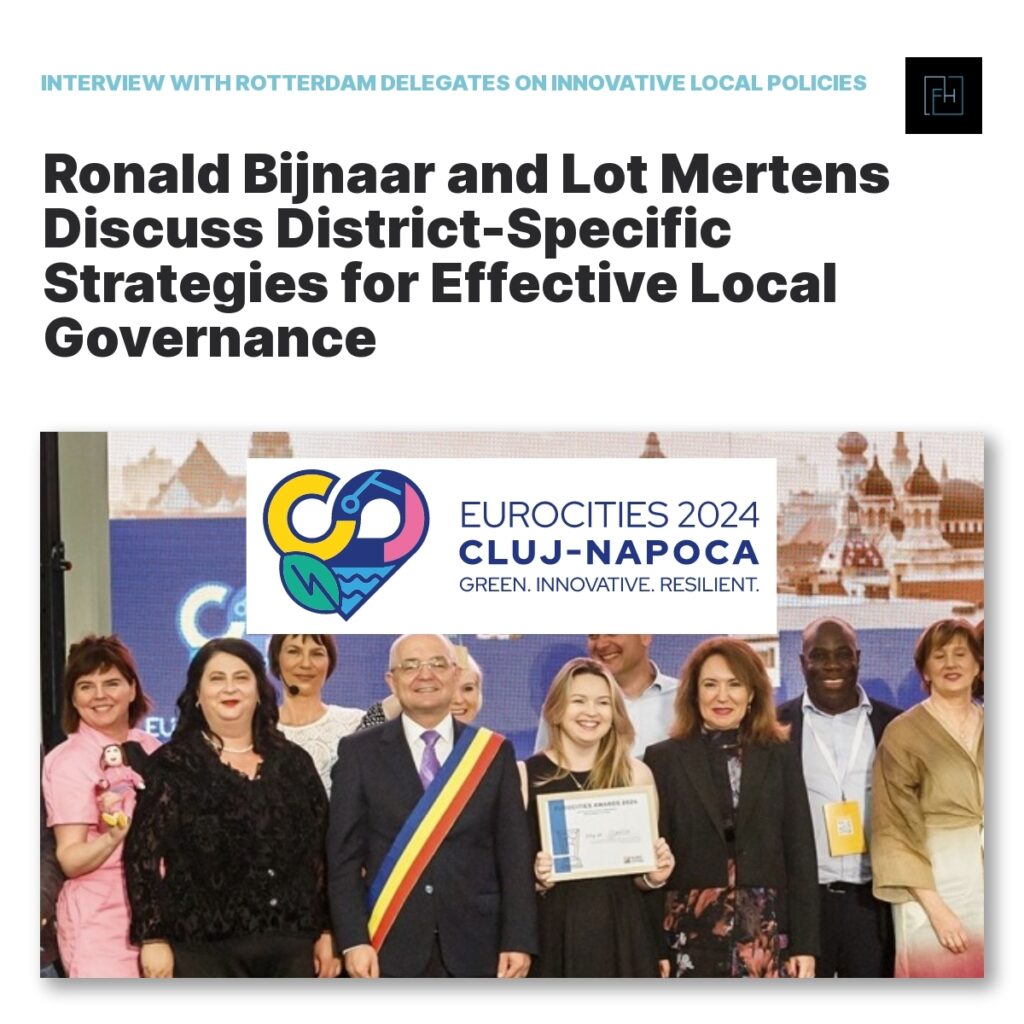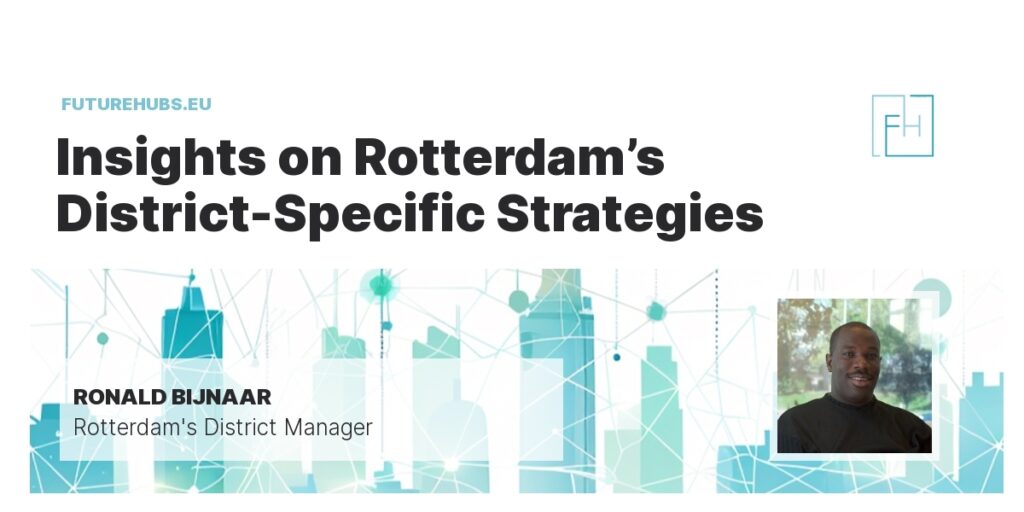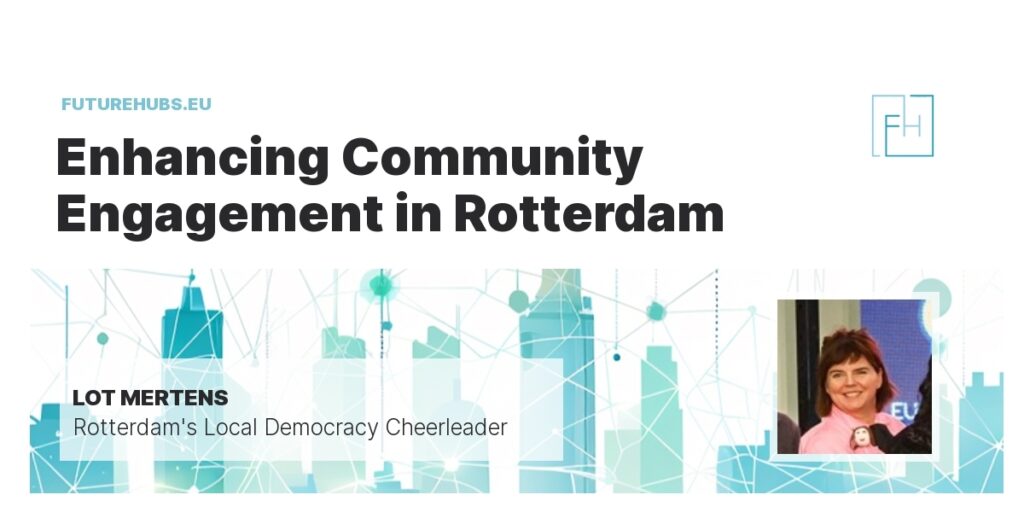
Visionaries Behind Rotterdam’s Local Democracy
In the vibrant city of Cluj-Napoca, during the Eurocities 2024 Annual Conference, we had the privilege of engaging with Ronald Bijnaar, the district manager from Rotterdam, and Lot Mertens, the city’s local democracy cheerleader. Their innovative approaches to urban governance and mobility have set a new benchmark for other cities across Europe. Here, we delve into the key strategies and successes of Rotterdam, as shared in our interview.
Objectives and Experiences at Eurocities 2024
The Rotterdam team attended the conference with high expectations, fueled by their nomination for the Creative Elections Campaign Award for their project, ‘Wijk aan Zet’ (It’s up to the neighbourhood). This innovative electoral model allows residents to have a significant say in their local governance, a testimony to Rotterdam’s commitment to hyperlocal democracy.
Ronald Bijnaar & Lot Mertens: “The reason for participating in the conference was the nomination for the Creative Elections Campaign Award. We were nominated for ‘Wijk aan Zet,’ a Rotterdam method of hyperlocal democracy in which residents get a say in their neighbourhood.”
The Rotterdam representatives team was pleasantly surprised by the hospitality and charm of Cluj-Napoca.
“Our stay was very good. We did not know what to expect from this city in Transylvania but we immediately felt at home when we arrived. We met friendly people in the taxi and in restaurants; many speak English and enjoy having a chat. Besides, the city has a cozy atmosphere. The big event in the city centre was a real treat!”
Rotterdam’s Innovative Electoral Model: Wijk aan Zet
In 2022, Rotterdam introduced ‘Wijk aan Zet,’ a revolutionary electoral model of local governance. This model groups the city’s 80 neighbourhoods into 39 districts, each with its own council, diversifying representation and empowering citizens.
The team mentioned that: “Unlike the national elections, young people from the age of 16 were allowed to stand for election and vote in the district council polls. Further candidates do not have to be members of a political party; they can stand as individuals or on behalf of a non-political organisation.”
The neighbourhood councils’ election campaign resulted in greater diversity of candidates and, ultimately, of representatives. This has improved the representation of residents, and participation in elections is not only reserved for an old and highly educated section of society.
“Turnout at elections in Rotterdam is very low. Therefore, it is important not only to invest in a higher turnout but also to ensure a strong connection with residents during an administrative period. One way to do this is to cooperate with neighbourhood councils. These councils represent the voice of the residents. You could say that the city council has a limited mandate because few residents go to the ballot box. By installing neighbourhood councils, the city council overcomes this democratic deficit.”
Ronald Bijnaar, Rotterdam District Manager.

Overcoming Challenges
Implementing such innovative approaches comes with its challenges, primarily adjusting the administration’s modus operandi and maintaining the trust of residents.
The Rotterdam Representatives: “The most challenging element of Wijk aan Zet is the fact that the administration has to change its modus operandi because that’s what neighbourhoods ask. With district agreements, we make agreements on actions to be carried out per neighbourhood…
These agreements are a good start because they are linked to political goals in the municipal council. But neighbourhood councils challenge the administration because the perspective of neighbourhood councils is different from the way the municipality is organised. The municipality has to work not only with residents but also with different policy departments. This requires a lot from the municipality!
Another challenge is for the members of the neighbourhood councils to retain the
trust of the residents who voted for them. We therefore encourage neighbourhood councils to invest in their relationship with residents and challenge them to be creative in their communication.”
When asked about future plans and overcoming challenges, Ronald Bijnaar explained: “We make agreements on actions to be carried out per neighbourhood”. This emphasis on creative communication strategies is essential for keeping the community informed and involved. By leveraging a variety of communication tools and platforms, neighbourhood councils can ensure that their initiatives are transparent and that feedback from residents is actively sought and integrated into decision-making processes.
While the Wijk aan Zet model brings about significant administrative changes and requires substantial effort to manage diverse perspectives, it also offers a robust framework for enhancing democratic participation and addressing local issues effectively. By making district-specific agreements and fostering strong community relationships, Rotterdam is paving the way for a more inclusive and responsive urban governance model.
Clean Mobility in Rotterdam
Rotterdam’s commitment to sustainable urban development extends to its clean mobility initiatives. Though the interview did not delve deeply into these initiatives, the city is recognized for its comprehensive Rotterdam Mobility Approach, which integrates various sustainable transport solutions to reduce the city’s carbon footprint.
“Rotterdam adopts a mobility approach at the neighbourhood level, working closely with residents and neighbourhood councils to promote clean mobility. We encourage walking and cycling, making improvements collaboratively with the community rather than imposing top-down solutions.”
Lot Mertens, Rotterdam’s Local Democracy Cheerleader.

Insights and Future Projects
The conference sessions provided valuable insights, reinforcing the importance of resident engagement and the utility of district hubs.
Lot Mertens: “Discussions during Eurocities 2024 showed that it is important to stay in touch with residents. It strengthened our recent practice of working with district hubs. These have been set up as a local office where residents can easily drop in with questions and ideas.”
The two representatives emphasised the importance of learning and collaboration among cities, encouraging continued engagement in local democracy: “It is important to learn from each other so we should definitely seek each other out. We are very interested to continue working on local democracy and engaging citizens.”
Embracing Innovation and Collaboration for a Resilient Future
Rotterdam’s pioneering efforts in local democracy and sustainable urban development serve as a beacon of innovation for cities worldwide. The insights shared by Ronald Bijnaar and Lot Mertens underscore the importance of adaptability, resident engagement, and bold governance in addressing the complex challenges of modern urban life.
As cities across Europe grapple with the dual imperatives of fostering civic participation and ensuring environmental sustainability, Rotterdam’s ‘Wijk aan Zet’ and clean mobility initiatives offer a compelling blueprint. The city’s approach demonstrates that empowering citizens and integrating their voices into the fabric of local governance can lead to more resilient, inclusive, and vibrant urban communities.
The discussions at Eurocities 2024 have reinforced the necessity for ongoing dialogue and knowledge exchange among urban centres. Rotterdam’s commitment to learning from peers and sharing its own experiences highlights the collective strength of the Eurocities network. By embracing such collaborative frameworks, cities can accelerate their progress towards a future that is not only sustainable but also deeply democratic.
In an era where cities are at the forefront of addressing global challenges, Rotterdam’s experiences and strategies provide invaluable lessons. As policymakers and urban planners reflect on the outcomes of Eurocities 2024, the message is clear: innovative, community-driven approaches are essential to building the resilient cities of tomorrow.
I like this blog very much, Its a really nice
office to read and obtain info.
We’re Really Glad to hear that! Stay tuned for more urban innovations, inspiring interviews and more!